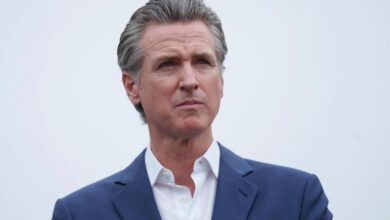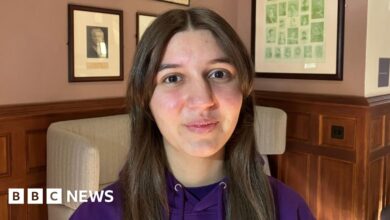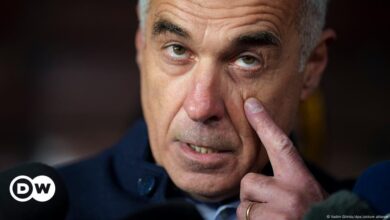Mass crowds in Damascus for first Friday prayers since Assad’s fall

Syrians gathered for their first Friday prayer following the fall of President Bashar al-Assad’s government.
The Prayer
Ahmad al-Sharaa, formerly known as Abu Mohammed al-Golani, leader of the insurgent forces that swiftly toppled Bashar al-Assad in a 10-day march to Damascus, appeared in a video message celebrating the victory.
In his message, al-Sharaa said he would like to congratulate “the great Syrian people for the victory of the blessed revolution.”
“I invite them to head to the squares to show their happiness without shooting bullets and scaring people,” he said. “And then after we will work to build this country and, as I said in the beginning, we will be victorious by the help of God.”
Friday prayers carry significant symbolism in Syria as they were a rallying point during the early days of the 2011 uprising-turned-civil war, when protesters flooded the streets after leaving mosques. Thousands of Syrians gathered in the nation’s capital of Damascus.
“Unified Syria to build Syria,” the crowd chanted in Damascus’ Umayyad Square. Some of them hurled slurs at the former president and his late father, referring to them as pigs—an insult that, under the Assad regime, would have resulted in imprisonment in one of the country’s notorious detention centers.
AAREF WATAD/AFP via Getty Images/Getty Images
Syrian Rebellion
Assad’s government collapsed last weekend following a swift offensive by the rebel group Hayat Tahrir al-Sham (HTS), which has been classified as a “foreign terrorist organization” by the U.S. since 2012.
Sharaa’s force, Hayat Tahrir al-Sham, along with allied insurgents, moved quickly to establish security and initiate a political transition after capturing the capital early Sunday. They are working to reassure a public still reeling from the collapse of a regime that ruled with an iron grip and is uneasy about the presence of extremist jihadis within the insurgent ranks.
The crowd in Damascus on Friday included numerous families with children, with some demonstrators traveling from distant parts of the country, including Idlib—the longtime rebel stronghold in northwest Syria that had remained isolated for years on the opposite side of the civil war’s front lines.
Wardan Aoun, a fighter from Idlib, said: “There is a good government now, and God willing, corruption will be gone. We lived in Idlib under this government and there is no corruption there.”
Khaled Abu Chahine, 51, from Kafr Shams in Syria’s southern Daraa province—where the 2011 uprising began—expressed hope for “freedom and coexistence among all Syrians, Alawites, Sunnis, Shiites, and Druze. No to racism.”
Blinken Meets With Turkish Foreign Minister
As the Friday prayer unfolded, the top U.S. diplomat was in the region meeting with regional powers to discuss Washington’s stance on the developments in Syria.
In Ankara, Turkey’s capital, U.S. Secretary of State Antony Blinken said Friday that there was “broad agreement” between the United States and Turkey on their vision for Syria’s future.
In a statement, Blinken said the broad agreements starts “with the interim government in Syria – one that is inclusive and non-sectarian, one that protects the rights or minorities and women, one that preserves institutions of the state and delivers services to the people.
“One that deals with any chemical weapons it may find to secure them and appropriately destroy them, one that rejects any alliances with extremist groups, and of course one that does not pose any kind of threat to any of Syria’s neighbors.”
This article includes reporting from the Associated Press.




